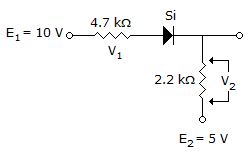Electronic Devices - Diode Applications - Discussion
Discussion Forum : Diode Applications - General Questions (Q.No. 24)
24.
Determine V2.

Discussion:
8 comments Page 1 of 1.
Komal said:
1 decade ago
The ans will be:
(10-.7-5)*2.2k/(2.2k+4.7k)
By using vtg division rule
(10-.7-5)*2.2k/(2.2k+4.7k)
By using vtg division rule
Steve ravi said:
1 decade ago
Please tell me about vtg division rule.
(1)
Asif said:
1 decade ago
Voltage division rule is useful for determining the voltage drop across the resistance within a series circuit:
General formula
Vrx=(rx/rt)*Vt :voltage across a resistance rx, rt is the sum of resistance in circuit.
General formula
Vrx=(rx/rt)*Vt :voltage across a resistance rx, rt is the sum of resistance in circuit.
Kothapeta siva krishna said:
1 decade ago
Apply kvl in the i/p loop by assuming voltage drop across the diode is 0.7 then we get I = 0.628ma. v2 = 2.2k*0.628m.
(2)
PAWAN said:
1 decade ago
10-4.7KI-0.7-2.2KI-5 = 0.
10-5.7 = (4.7K+2.2K)I.
4.3 = 6.9I.
I = 0.623.
V = 2.2*0.623 = 1.371 v.
10-5.7 = (4.7K+2.2K)I.
4.3 = 6.9I.
I = 0.623.
V = 2.2*0.623 = 1.371 v.
Sihle said:
1 decade ago
Will Kirchhoff's theorem not give the answer in this problem.
(2)
Surya said:
1 decade ago
Effective voltage = E1-E2-diode drop.
= 10-5-0.7
= 4.3 V.
Total resistance = 6.9 k.
Current = 4.3/6.9*10^3
= 0.623 mA.
Voltage drop across v2 = 0.623*10^-3*2.2*10^3.
= 1.37 v.
= 10-5-0.7
= 4.3 V.
Total resistance = 6.9 k.
Current = 4.3/6.9*10^3
= 0.623 mA.
Voltage drop across v2 = 0.623*10^-3*2.2*10^3.
= 1.37 v.
Nihad said:
2 years ago
How to find v0 voltage? Anyone, please explain to me.
Post your comments here:
Quick links
Quantitative Aptitude
Verbal (English)
Reasoning
Programming
Interview
Placement Papers